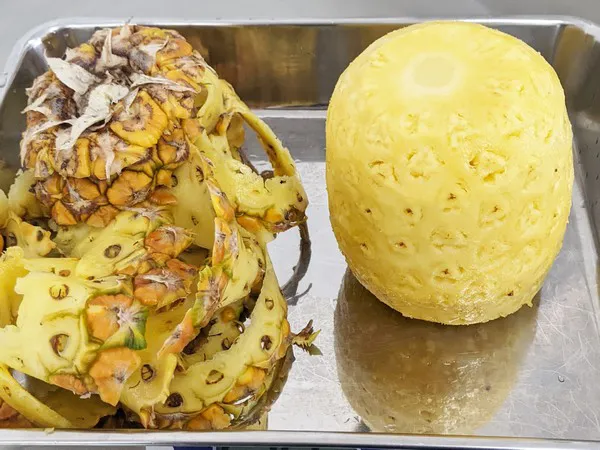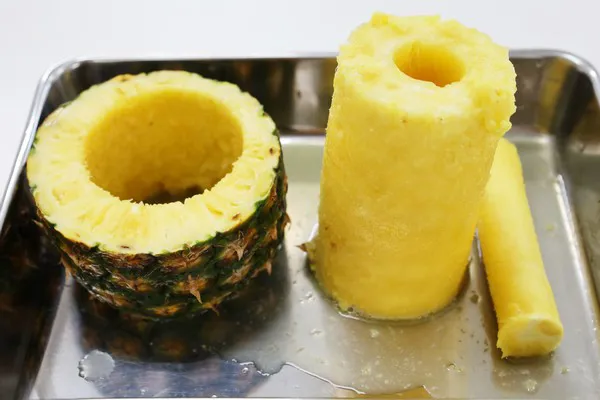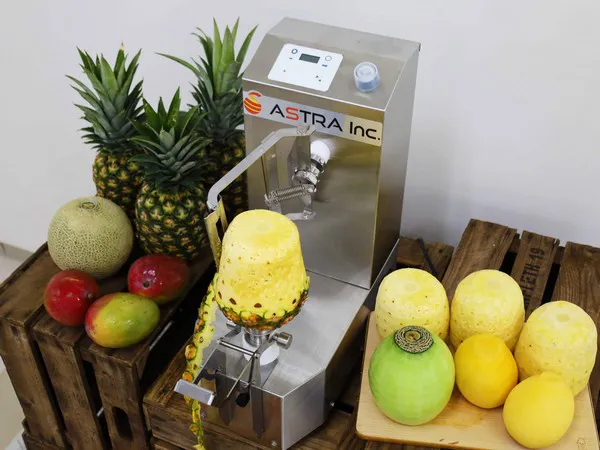As society becomes more concerned about sustainability and the cost of decomposition increases, the catering sector is looking for possibilities to produce less waste and more efficient ways to deal with the waste. Astra is a peeler innovator in Japan and the company manufactures peeling machines for various types of fruits. Last month, the company started a cooperation with a local decomposition machine manufacturer for handling pineapple skins. Ryo Takeshita, the sales manager at Astra shared his thoughts on this recent development.
“Consumers can get freshly peeled pineapple for a lower price”
Ryo first told the story of how the pineapple peelers were developed. “We often see that ready-to-eat pineapples are sold in small sealed packages in supermarkets. Such ready-to-eat packages are often processed in factories and then shipped to retail stores. But the problem is, the pineapple is quite perishable. When kept on the shelf for a longer time, or when the surrounding temperature changes during processing or in transport, the quality of the cut fruits deteriorates and the fruits easily rot. This not only results in food waste at the retail store but may also lead to consumer complaints. As a peeler innovator, we started to think about how we can provide an easier solution so that consumers can easily eat freshly peeled pineapple for a lower price. That is why we launched our pineapple peeling machine series 3 years ago.”

“Factories can be profitable with 40% less waste and 60%+ more yield”
“Most of the peeling machines used in big pineapple processing factories are often traditional cutter machine, which cores and punches the cylinder-shaped pineapple. Using that tool, almost 2/3 of the pineapple is wasted.” Ryo said, “In comparison, our KA-750PM unit can peel over 200 pineapples/hour, which can save up to 40% less waste compared with the traditional machine. Let’s say, if the company produces 100kg cut pineapple per day, the cost-saving will be $50,000 a year.
When asked about the technical strength of the machine, Ryo introduces, “The specialty is the ‘blade peeler’. The blade is straight, sharp, and thin. When turning, the blade moves in a polygonal way, while always tightly pressed to the surface of the fruit,” Ryo said. “Such a ‘blade peeler’ generates a variety of benefits about peeling performance. First of all, the fruits’ peeling surface is much smoother. This results in low pulp waste and fewer juice drippings. Also because of the smoother surface, the fruit has a longer shelf life and can keep fresh for a longer period. Secondly, the straight blade performs faster with high accuracy, which results in a better yield rate.” Ryo added: “Only one worker is needed for the whole peeling process. Our test results show that Astra peeler achieves 60%+ yield compared with traditional peeling methods.”

“Thinner pineapple skins contribute to sustainability”
“Sustainability is a hot social discussion topic in Japan, and we as an innovative manufacturer also feel responsible for contributing. We are currently cooperating with a food waste decomposition machinery company in Japan. The company manufactures compact-sized (capacity around 30-100kg) food-waste decomposer which uses microorganisms. The strength of their decomposer is that food waste completely changes to water and heat. Since their machines are small, it is often used in school food centers, small stores, and small-sized food factories, which shares the customers completely with ASTRA.”
“For pineapple, when using a traditional corer, the waste of the skin is very thin and heavy. Even using a great decomposer, it takes a few days-to-a-week to decompose all the waste, so the customer had to throw away the food waste. In Japan, companies have to pay a high cost for troughing away food waste, so their customers are looking out for a way to reduce pineapple skin waste. After reaching out, we found out that using ASTRA peeler, the pineapple skin becomes very thin after peeling so that we can decompose them all in one night.”
“As we share the same type of customers, we decided to collaborate with each other,” Ryo said. “Using the peeler and decomposer together, it contributes to the SDGs, so the customers can easily get grants and subsidies.”

Over the past 20 years, ASTRA has been fully dedicated to automatic peeler innovation. Aside from the KA-750PM pineapple peeler, Astra has a series of peeling machines including the KA-700H for oranges, apples, and kiwis.
ASTRA Inc.
Mr. Ryo Takeshita
Tel.: +81 0245412444
Email: [email protected]
https://en.e-astra.co.jp/
